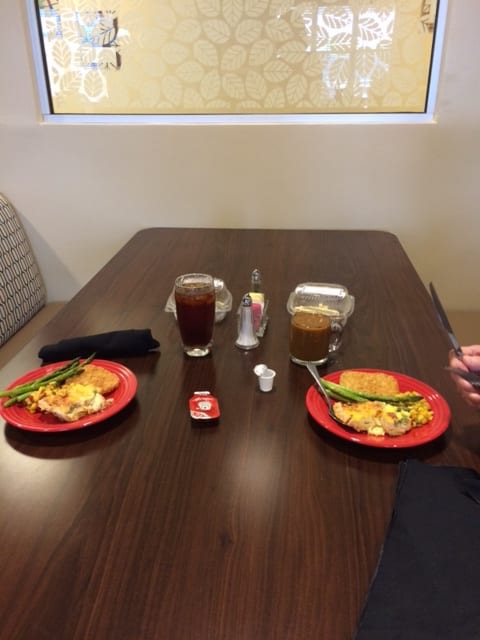As I drove south on 29 to visit my mother last weekend, I thought about Vivian Gornick’s Fierce Attachments, a memoir about the author’s relationship with her mother. Though younger than my mother, Gornick also grew up during the Depression and War years and was a young adult in the 50s. But Gornick’s world and her relationship with her mother could not have been more different from my mother’s with hers – or so I thought.
Gornick framed her memoir with people in place and time, working-class immigrants living in the Bronx during the 40s and walking with her mother on the streets of Manhattan in the 80s. “We always walked, she and I,” Gornick wrote about her mother. And they talked fiercely, their bond a caustic one.
 I parked the car in the lot outside Mother’s room, and after a pit stop, we made our way to the Bistro. We checked the menu and decided on ham and broccoli quiche, fresh asparagus, a corn medley and hash browns. After the cashier rang up our meals, including lemon cake and drinks, we navigated towards our favorite booth.
I parked the car in the lot outside Mother’s room, and after a pit stop, we made our way to the Bistro. We checked the menu and decided on ham and broccoli quiche, fresh asparagus, a corn medley and hash browns. After the cashier rang up our meals, including lemon cake and drinks, we navigated towards our favorite booth.
Once we caught up on the news, I asked, “Did your mother ever talk to you?”
“No,” Mother said with a wry smile.
“Did your parents talk to each other?”
“Not much.”
“When they did, what did they talk about?”
“The weather.” Mother laughed outright.
Typical New Englanders, I thought, rural Maine and Canada, to be more accurate. Not much walking going on there either, unless it was related to farm work, church or snowshoeing to school.
“We listened to the radio in the living room, so we kept up with the news,” Mother said. “We all had our favorite radio programs. Also, Dad went to town and brought back the gossip, and his brother Fred who lived up the road always listened on the party line. We knew because we could hear his clock ticking over the phone. But in person, he’d pretend he hadn’t been listening.” She chuckled again.
There were few secrets in that farming community in northern Maine, and the same was true of Gornick’s community of New York City apartment dwellers. Leaning out windows, running into neighbors in hallways or peering through doorways was the same as eavesdropping, town gossip or Sunday School Picnics. People knew everyone’s business.
Mother continued. “The kitchen was where everything happened. In the winter we moved the dining room table into the kitchen and did our homework or played Rook in the evenings. My mother did needlework.”
As Gornick wrote, “In the kitchen there was pitch and tone, the atmosphere fell and rose, dwindled away, churned itself up again. There was movement and space, light and air. You could breathe. You could live.”
Mother was still talking as we finished lunch and walked back to her room. “Arlene was five years older than me so she and Mother did the cooking and sewing.”
“Not you?”
“No, my chores were mostly outside, except for dusting and the hand laundry. I remember when Mother got her washing machine. She polished it all up, really babied it. It saved her a lot of time. She’d start it – exhaust outside the kitchen – and we’d hear Put-Put-Put-Put-Put.”
Gornick about her Mother: “So this was her condition: here in the kitchen she knew who she was, here in the kitchen she was restless and bored, here in the kitchen she functioned admirably, here in the kitchen she despised what she did.”
“Mother always wanted to be a doctor,” my mother said of hers, “and she would have been a good one.”
My grandmother, like Gornick’s mother, made sure her daughter got an education. Though my mother spent plenty of time in the kitchen, she also worked outside.
And so did I.



I often think about the conversations I had with my mother as we did the laundry in our basement when I was in high school. The damp smell of laundry often jettisons me back in time to the sound of my mother’s voice describing the poverty of her life but the richness of her family. She told story after story about her Irish family and the laughter and fun they had even though their lives never had any stability since grandma, a widow who could neither read nor write, would sublet apartments which meant they moved every year all over the Irish part of Milwaukee, looking for a better deal. I wish I had run back upstairs to my room to write all these stories down but the urgency was not pressing me into action. What I wonder about now is what stories I would have heard if dementia had not robbed her of her connections to her past. After my father died, I found a treasure trove of information about my mother written amongst the pages of her high school year books. She was known as a “writer” and a lover of literature , admired by many as notes to her from classmates became testimonies of her worth. Yes. And the strongest visual of my mother is seeing her in the small country style kitchen sitting at the table reading a book.
What a lovely testament to your mother! Smells of laundry, cooking and cleaning evoke memories for us all. I hope you take those memories and your mother’s treasure trove and write her stories. You are you mother’s daughter.
Thank you for sharing your mother and yourself.